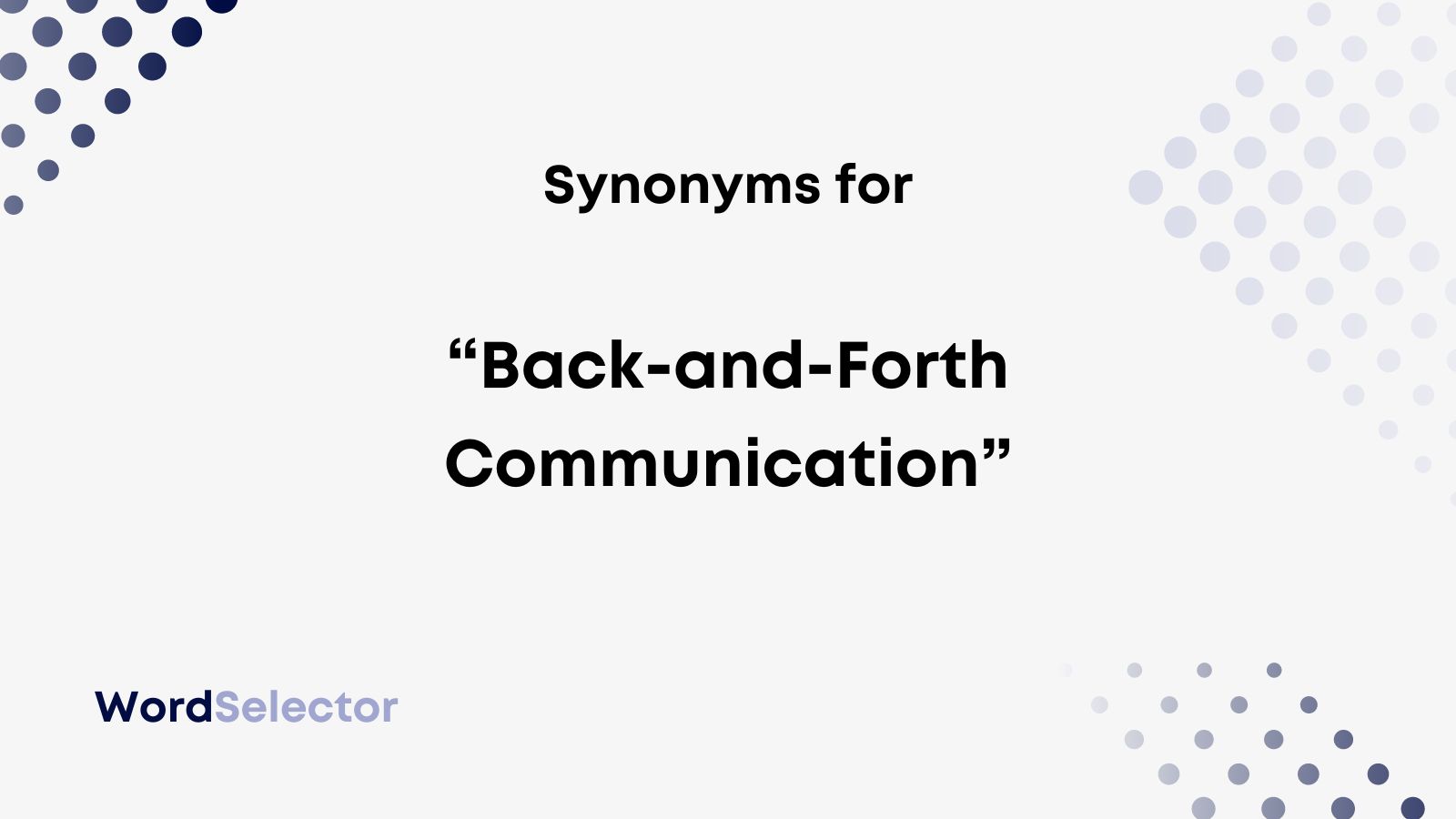You’re looking for a word or phrase that describes an exchange of emails at work. However, is the phrase “back-and-forth communication” suitable to use in professional circumstances?
We’ll answer that question down below. Moreover, we’ve provided a list of great alternative terms and phrases that you can use if “back-and-forth communication” starts to feel worn out!
“Back-and-Forth Communication” Synonyms
- Correspondence
- Banter
- Dialogue
- Discussion
- Give-and-take
- Parley
- Communication
- Catch up
- Conversation
- Negotiation
- Deliberation
- Debate
- Colloquy
- Chat
- Argy-bargy
KEY TAKEAWAYS
- “Back-and-forth communication” is a perfectly correct phrase that you can use in formal and informal settings.
- To keep your phrasing more diverse at work, you can use the professional phrase “correspondence.”
- In informal settings, you can use “banter,” which is an exchange of playful remarks.
Stick around! In the next section, we’ll show you our favorite formal and informal synonyms for “back-and-forth communication.” We’ll even use our choices in some example sentences!
Afterward, we’ll discuss the correctness of the original phrase. Should it be hyphenated?
Correspondence (Formal)
Another way to say “back-and-forth communication” in a professional setting is “correspondence.” In particular, “correspondence” refers to an exchange of letters, messages, or emails.
Therefore, if you are looking for one word to describe “back-and-forth” emails, this is a suitable alternative to use.
It isn’t a better phrase than “back-and-forth communication.” In fact, you can use either one of these terms in the workplace to describe an exchange of emails.
However, “correspondence” comes across as a tad more formal. Moreover, it’s a touch more concise! Thus, if you want to maintain an especially serious tone at work, you may prefer it.
Let’s see how you can use this phrase in a sentence:
I’ve been in correspondence with Mr. Brown’s attorney, and I believe we may have come to an agreement.
Keep track of your correspondence with their team.
Banter (Informal)
“Banter” refers to an exchange of playful or teasing remarks, usually between friends. Therefore, this is a good informal synonym for friendly and casual “back-and-forth communication” between you and someone else.
You shouldn’t use this phrase in the workplace. In fact, you probably shouldn’t engage in banter at work. Unless, of course, you have a very friendly dynamic at your office.
Therefore, when you’re describing an email exchange with a client, you should probably use one of the more formal alternatives on our list.
Nonetheless, let’s see this term in action in a couple of examples:
Sipho and I always have great banter at work, but it’s probably going to get us in trouble one of these days.
I’m not being mean, it’s just a bit of banter!
Is It Correct to Say “Back-and-Forth Communication”?
The phrase “back-and-forth communication” is completely correct and suitable to use in professional circumstances.
Essentially, the term “back-and-forth” is neither particularly formal nor informal. Thus, you can use it in any situation, depending on the surrounding context.
Nonetheless, you can use our list of synonyms if you’re looking for a more concise alternative. Or, if you just want to mix up your language and keep your work communications diverse. If not, the original phrase is perfectly effective in its own right.
If you’re deciding whether it’s correct to hyphenate “back-and-forth,” we’ll discuss that in the next section.
In short, both “back-and-forth” and “back and forth” are correct. However, “back-and-forth” is a compound adjective and should usually precede the noun in a sentence.
For instance:
- Sorry for the back-and-forth messages all morning.
Meanwhile, the phrase “back and forth” is an adverb and describes how you have been communicating. For example:
- We have been communicating back and forth for a few months now.
In conclusion, “back-and-forth communication” is a correct and perfectly professional phrase to use at work.
Nonetheless, if you think you might like to try one of the alternative phrases we’ve provided above, go ahead and bookmark this page for later!

